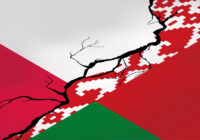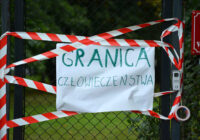Ukrainian refugees fleeing to Poland from the horrors of Russian aggression have met with a warm welcome. The Poland-Ukraine border, which constitutes the EU’s eastern frontier, opened for the massive influx of despairing people. But, just a hundred kilometers up north, refugees, mainly from the Global South, who are trying to cross the Poland-Belarus border have been experiencing a different treatment: barbed wires and walls, hindering them from entering the country and even if they manage to cross them, they are pushed back. What lies behind those different approaches?
A country transformed into an NGO
In the first month following the Russian invasion of Ukraine, Warsaw’s population has grown by 17%, whereas Poland has become a country with the second-largest refugee population in the world. Approximately 2.6 million out of 4.6 million people fleeing Ukraine in the first two months of the war found shelter in Poland; currently, 1.5 million remain there.
This sudden influx of refugees caught Polish authorities by surprise even though since 2015, they had rejected relocation of refugees from the Middle East under the claim that Poland had to be ready to escalate the war in Ukraine. Despite the unpreparedness, the Polish government quickly lent a helping hand to Ukrainians by simplifying border crossing procedures, offering free transportation, and enabling them to receive a Polish personal identification number (PESEL) which provided access to education, health care, labor market, and financial assistance.
However, the secret of why Poland stood up to the challenge has much more to do with the exceptional commitment of civil society and grassroots activism. Poles from all over Poland picked up refugees from the border, provided them with rooms in their own houses, helped with bureaucracy, organized crowdfunding, cooked meals, and opened free “shops.” According to Karolina Jeznach and Steffen Lüdke: “The feeling that Poland might be the next victim of Russian imperialism has transformed the country into something like a giant NGO.”
Good will may not be enough
So far, Poland seems to have passed the “solidarity test.” Still, there have been fears that even the best intentions and open doors might not be enough to assist Ukrainian refugees in the long term perspective and considering that Russian disinformation on Polish social media has not said the last word yet, Ukrainians arriving in Poland belong to particularly vulnerable groups: they are predominantly women, children and the elderly.
The need for assistance is enormous, but among volunteers, there might also be people with ill intentions. Therefore, they should be verified to exclude those sentenced for various forms of abuse. This is one of the cases where state coordination is crucial.
Many refugees express interest in staying and working in Poland due to its geographical, cultural, and linguistic proximity to Ukraine. But although the country has one of the lowest unemployment rates in the EU, the market can absorb only every fifth Ukrainian willing to work.
The Polish government does not consider relocation of refugees to other EU countries, but it expects EU financial aid in return. NGOs warn that more funding should be transferred to the local actors and organizations on the front lines rather than the government.
There is also a risk that populists could exploit challenges stemming from a sudden wave of refugees (and some groups already do) to stir up hatred since Poland is facing some critical burning issues: galloping inflation, underfinanced public services, the lowest number of medical personnel in the EU and the lowest expenditure on health care, soaring rents and flat shortage. The grievances about the “privileges” of Ukrainians seem relatively isolated, but the support has decreased.
Whereas 90% of Poles felt optimistic about Ukrainian refugees in April 2022, 71% favored taking up refugees in Poland. Some surveys paint a gloomier picture: they show that although the Poles support the Ukrainian cause, they harbor grievances against Ukrainian refugees for – amongst others – the reasons mentioned above. Therefore this issue should be addressed timely to avoid social tensions and being turned into a political weapon in the parliamentary elections in 2023.
Refugees welcome
The underlying reasons for the warm welcome of Ukrainians are manifold. As neighboring Slavic countries, Ukraine and Poland share many cultural, linguistic, and historical ties (although history often proved to be the bone of contention).
On the eve of the war Ukrainian diaspora in Poland amounted to about a million, and Ukrainians also constituted more than 50% of international students. Therefore, the first wave of refugees fled predominantly to their relatives and friends. Many Poles know someone from Ukraine. This does not mean that the relationship was free of discrimination: cases of abusing Ukrainian workers or politically incorrect remarks were many.
Another factor that unites both countries is the common enemy. Unlike Hungary, Poland has been strongly resenting Russian political elites for decades, if not centuries. Poles fear that their country could become the next target of Russian aggression and identify themselves strongly with the plight of Ukraine. In the days following the Russian attack, shelves in many shops in eastern Poland turned empty, and long lines were built in front of ATMs and petrol stations.
People all over Poland applied for new passports in masses. Most Poles know of war from history, but the memory of World War II is still very vivid in the collective memory. To many, the unjustified Russian aggression against Ukraine echoes Poland’s fate: the attack by Nazi Germany and the subsequent charge of the Soviet Union under the guise of “brotherly help” against the Nazis.
Last but not least, refugees from Ukraine fit well in the “romantic” perception: they are predominantly women and children, in the eyes of many, “the proper refugees.” This is mainly because Ukrainian men between 18 and 60 are not allowed to leave Ukraine.
Refugees unwelcome
The warm welcome of Ukrainians is in stark contrast with the treatment of refugees on the Poland-Belarus border, where many people are still trapped. Polish Border Security Guard regularly informs about push backs and “illegal crossings to Poland” on the Poland-Belarus border by people from Yemen, Ethiopia, Syria, and Afghanistan – countries torn by conflicts or in dire humanitarian situations.
From the beginning of 2021 until Dec. 19, approximately 15,000 people tried to enter Polish territory over the Poland-Belarus border. For many, deportations would equal death. Their plight did not go unnoticed among Ukrainian organizations, which wrote an open letter to the Polish government and Border Security Guard pledging equal treatment of all refugees.
A decisive factor differentiating the treatment of refugees is the intervention of authorities and politicization of the issue. On the border with Ukraine, the government did not erect walls or penalize any attempt to help by the locals, media, doctors, or volunteers. NGOs were not banned from the border area. But this has been common practice just a hundred kilometers up north.
The government and the public broadcaster quickly labeled refugees from the Global South as “dangerous,” “illegal,” or “economic” migrants sent by the much-scorned Belarussian dictator Alexander Lukashenko to destabilize Poland. The last argument is true, which is why many EU countries supported Poland. Still, less attention was given to the fact that those people were deceived and involuntarily turned into pawns in Lukashenko’s vendetta.
Many helped refugees despite legal consequences and the“criminalization of solidarity.” Some locals fed or allowed them in their homes, volunteers from all over Poland searched for them in forests close to the special emergency zone to help them apply for asylum and offer warm clothing and food, and some also cut the barbed wire on the border.
Numerous demonstrations in large Polish cities and small towns close to the special emergency zone took place. Polls published in early January 2022 indicated that 72% of Poles supported the “illegal” assistance to refugees.
This is not to say that the hostile policies of the Polish government do not enjoy the support of some groups in Polish society. Poland is one of the most ethnically and religiously homogeneous countries in Europe. Few people know a Muslim or someone from a Middle Eastern country. All information they receive comes from media and history textbooks.
In this overwhelmingly Catholic country, one of the most commemorated historical events is the Battle of Vienna 1683 against the Ottoman Empire, which perpetuates the self-perception of many Polish nationalists as Antemurale Christianitatis (Bulwark of Christendom). Even if widely reported, wars in Syria, Yemen, or Afghanistan are distant and incomprehensible to an average Pole.
However, it might be worth noting that in previous decades Poland accepted many Chechen refugees who were Muslims, and religion did not play a significant role in public discourse back then. It has become politicized in the last decade.
Poland as an immigration country
In the past decades, Poland used to be a country that people would migrate from or through rather than to. The last few years have shown that this trend has changed. However, the authorities and society might not be aware of and ready to embrace the ongoing changes.
Poland’s ethnic, cultural, and religious homogeneity is not necessarily an advantage. Unfortunately, the topic of refugees has too often been weaponized for political gains, affecting societal attitudes.
This can be illustrated by the year 2015 when most Poles initially stood behind the idea of supporting refugees but changed their approach radically when the issue became a leitmotif of the electoral campaign of the Law and Justice Party. Let us hope that the Polish parliamentary elections in 2023 will not follow the same pattern.
[Conner Tighe edited this piece.]
[Fair Observer is a media partner of Institute for the Danube Region and Central Europe.]
The views expressed in this article are the author’s own and do not necessarily reflect Fair Observer’s editorial policy.
Support Fair Observer
We rely on your support for our independence, diversity and quality.
For more than 10 years, Fair Observer has been free, fair and independent. No billionaire owns us, no advertisers control us. We are a reader-supported nonprofit. Unlike many other publications, we keep our content free for readers regardless of where they live or whether they can afford to pay. We have no paywalls and no ads.
In the post-truth era of fake news, echo chambers and filter bubbles, we publish a plurality of perspectives from around the world. Anyone can publish with us, but everyone goes through a rigorous editorial process. So, you get fact-checked, well-reasoned content instead of noise.
We publish 2,500+ voices from 90+ countries. We also conduct education and training programs
on subjects ranging from digital media and journalism to writing and critical thinking. This
doesn’t come cheap. Servers, editors, trainers and web developers cost
money.
Please consider supporting us on a regular basis as a recurring donor or a
sustaining member.
Will you support FO’s journalism?
We rely on your support for our independence, diversity and quality.







Comment